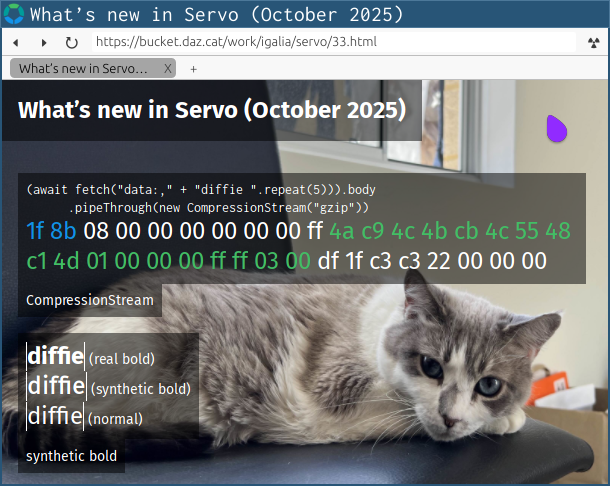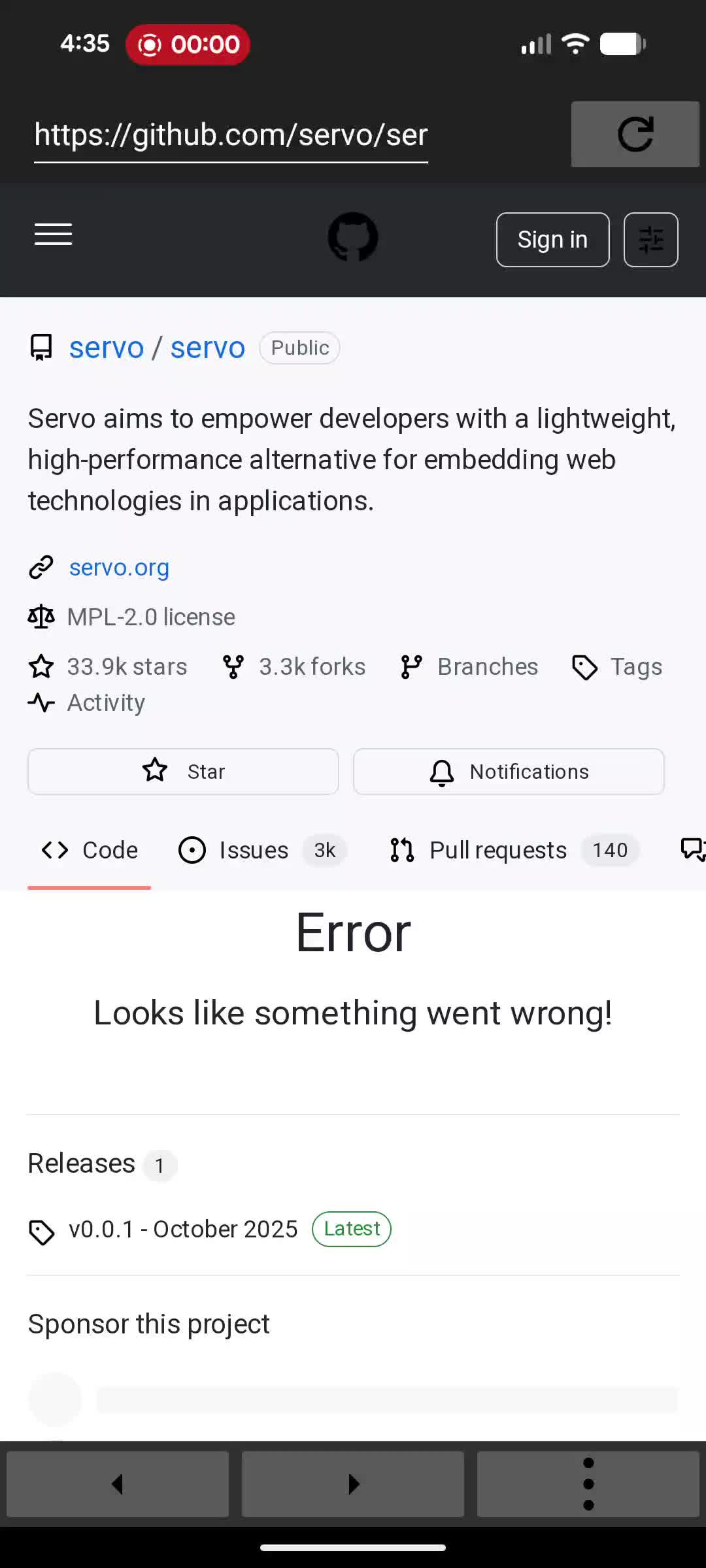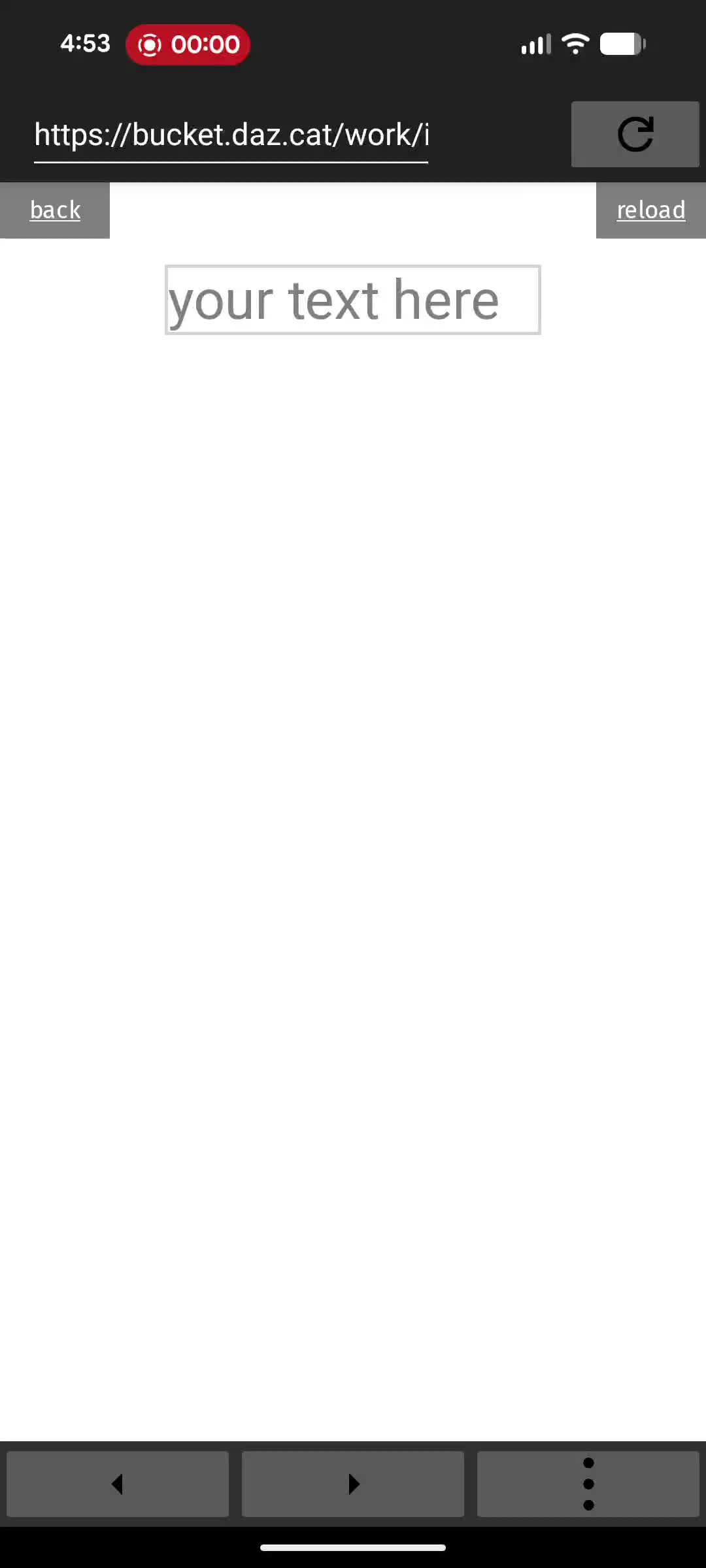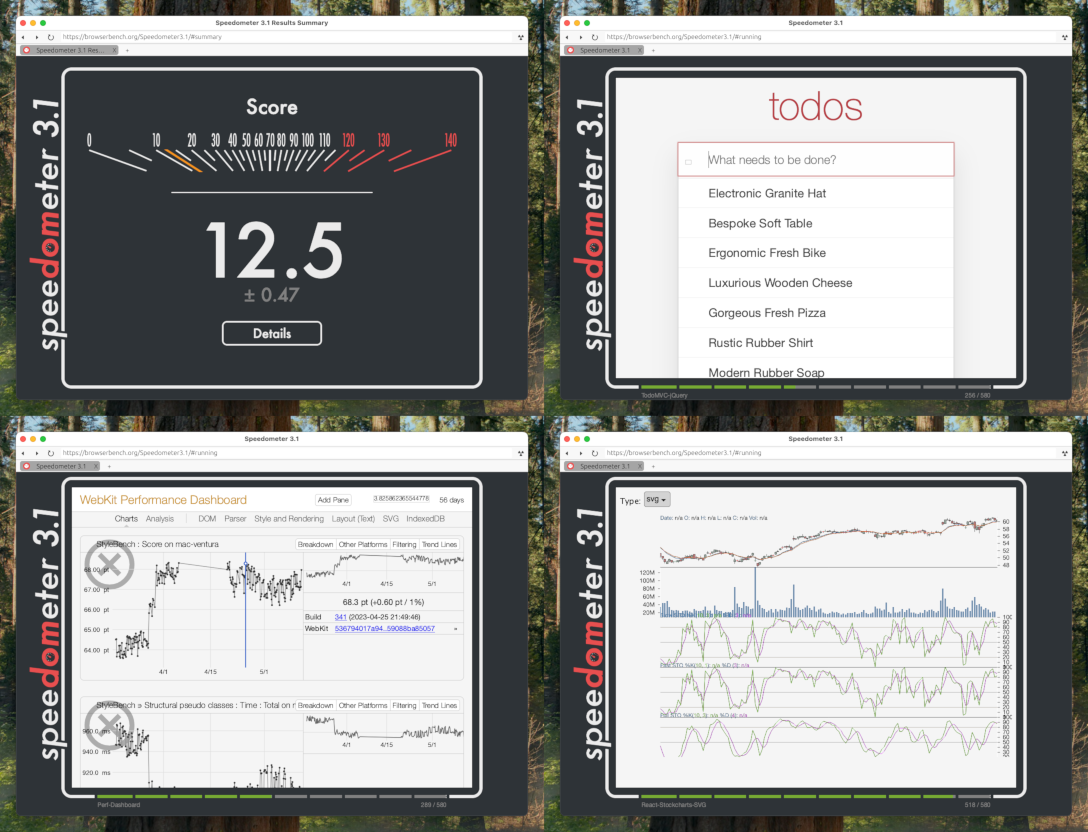Servo now supports several new web platform features:
- <source> in <video> and <audio> (@tharkum, #39717)
- CompressionStream and DecompressionStream (@kkoyung, #39658)
- fetchLater() (@TimvdLippe, #39547)
- Document.parseHTMLUnsafe() (@lukewarlow, #40246)
- the which property on UIEvent (@Taym95, #40109)
- the relatedTarget property on UIEvent (@TimvdLippe, #40182)
- self.name and .onmessageerror in dedicated workers (@yerke, #40156)
- name and areas properties on HTMLMapElement (@tharkum, #40133)

servoshell for macOS now ships as native Apple Silicon binaries (@jschwe, #39981). Building servoshell for macOS x86-64 still works for now, but is no longer officially supported by automated testing in CI (see § For developers).
In servoshell for Android, you can now enable experimental mode with just two taps (@jdm, #40054), use the software keyboard (@jdm, #40009), deliver touch events to web content (@mrobinson, #40240), and dismiss the location field (@jdm, #40049). Pinch zoom is now fully supported in both Servo and servoshell, taking into account the locations of pinch inputs (@mrobinson, @atbrakhi, #40083) and allowing keyboard scrolling when zoomed in (@mrobinson, @atbrakhi, #40108).
 ▶
▶
 ▶
▶
AbortController and AbortSignal are now enabled by default (@jdm, @TimvdLippe, #40079, #39943), after implementing AbortSignal.timeout() (@Taym95, #40032) and fixing throwIfAborted() on AbortSignal (@Taym95, #40224). If this is the first time you’ve heard of them, you might be surprised how important they are for real-world web compat! Over 40% of Google Chrome page loads at least check if they are supported, and many popular websites including GitHub and Discord are broken without them.
XPath is now enabled by default (@simonwuelker, #40212), after implementing ‘@attr/parent’ queries (@simonwuelker, #39749), Copy > XPath in the DevTools Inspector (@simonwuelker, #39892), completely rewriting the parser (@simonwuelker, #39977), and landing several other fixes (@simonwuelker, #40103, #40105, #40161, #40167, #39751, #39764).
Servo now supports new KeyboardEvent({keyCode}) and ({charCode}) (@atbrakhi, #39590), which is enough to get Speedometer 3.0 and 3.1 working on macOS.

ImageData can now be sent over postMessage() and structuredClone() (@Gae24, #40084).
Layout engine
Our layout engine can now render text in synthetic bold (@minghuaw, @mrobinson, #39519, #39681, #39633, #39691, #39713), and now selects more appropriate fallback fonts for Kanji in Japanese text (@arayaryoma, #39608).
‘initial-scale’ now does the right thing in <meta name=viewport> (@atbrakhi, @shubhamg13, @mrobinson, #40055).
We’ve improved the way we handle ‘border-radius’ (@Loirooriol, #39571) and margin collapsing (@Loirooriol, #36322). While they’re fairly unassuming fixes on the surface, both of them allowed us to find interop issues in the big incumbent engines (@Loirooriol, #39540, #36321) and help improve web standards (@noamr, @Loirooriol, csswg-drafts#12961, csswg-drafts#12218).
In other words, Servo is good for the web, even if you’re not using it yet!
Embedding and ecosystem
Our HTML-compatible XPath implementation now lives in its own crate, and it’s no longer limited to the Servo DOM (@simonwuelker, #39546). We don’t have any specific plans to release this as a standalone library just yet, but please let us know if you have a use case that would benefit from this!
You can now take screenshots of webviews with WebView:: (@mrobinson, @delan, #39583).
Historically Servo has struggled with situations causing 100% CPU usage or unnecessary work on every tick of the event loop, whenever a page is considered “active” or “animating” (#25305, #3406). We had since throttled animations (@mrobinson, #37169) and reflows (@mrobinson, @Loirooriol, #38431), but only to fixed rates of 120 Hz and 60 Hz respectively.
But starting this month, you can run Servo with vsync, thanks to the RefreshDriver trait (@coding-joedow, @mrobinson, #39072), which allows embedders to tell Servo when to start rendering each frame.
The default driver continues to run at 120 Hz, but you can define and install your own with ServoBuilder::.
Breaking changes
Servo’s embedding API has had a few breaking changes:
-
Opts::was removed; to wait for a stable image, callwait_for_stable_image WebView::instead (@mrobinson, @delan, #39583).take_screenshot -
MouseButtonAction::was removed; useClick Downfollowed byUp. Click events need to be derived from mouse button downs and ups to ensure that they are fired correctly (@mrobinson, #39705). -
Scrolling is now derived from mouse wheel events. When you have mouse wheel input to forward to Servo, you should now call
WebView::only, notnotify_input_event notify_scroll_event(@mrobinson, @atbrakhi, #40269). -
WebView::was renamed toset_pinch_zoom pinch_zoom, to better reflect that pinch zoom is always relative (@mrobinson, @atbrakhi, #39868).
We’ve improved page zoom in our webview API (@atbrakhi, @mrobinson, @shubhamg13, #39738), which includes some breaking changes:
WebView::was renamed toset_zoom set_page_zoom, and it now takes an absolute zoom value. This makes it idempotent, but it means if you want relative zoom, you’ll have to multiply the zoom values yourself.- Use the new
WebView::method to get the current zoom value.page_zoom WebView::was removed; usereset_zoom set_page_zoom(1.0)instead.
Some breaking changes were also needed to give embedders a more powerful way to share input events with webviews (@mrobinson, #39720). Often both your app and the pages in your webviews may be interested in knowing when users press a key. Servo handles these situations by asking the embedder for all potentially useful input events, then echoing some of them back:
- Embedder calls
WebView::to tell Servo about an input event, then web content (and Servo) can handle the event.notify_input_event - Servo calls
WebViewDelegate::to tell the embedder about keyboard events that were neither canceled by scripts nor handled by Servo itself. The event details is included in the arguments.notify_keyboard_event
Embedders had no way of knowing when non-keyboard input events, or keyboard events that were canceled or handled by Servo, have completed all of their effects in Servo.
This was good enough for servoshell’s overridable key bindings, but not for WebDriver, where commands like Perform Actions need to reliably wait for input events to be handled.
To solve these problems, we’ve replaced notify_keyboard_event with notify_input_event_handled:
- Embedder calls
WebView::to tell Servo about an input event, then web content (and Servo) can handle the event. This now returns annotify_input_event InputEventId, allowing embedders to remember input events that they still care about for step 2. - Servo calls
WebViewDelegate::to tell the embedder about every input event, when Servo has finished handling it. The event details are not included in the arguments, but you can use thenotify_input_event_handled InputEventIdto look up the details in the embedder.
Perf and stability
Servo now does zero unnecessary layout work when updating canvases and animated images, thanks to a new “UpdatedImageData” layout mode (@mrobinson, @mukilan, #38991).
We’ve fixed crashes when clicking on web content on Android (@mrobinson, #39771), and when running Servo on platforms where JIT is forbidden (@jschwe, @sagudev, #40071, #40130).
For developers
CI builds for pull requests should now take 70% less time, since they now run on self-hosted CI runners (@delan, #39900, #39915). Bencher builds for runtime benchmarking now run on our new dedicated servers, so our Speedometer and Dromaeo data should now be more accurate and less noisy (@delan, #39272).
We’ve now switched all of our macOS builds to run on arm64 (@sagudev, @jschwe, #38460, #39968). This helps back our macOS releases with thorough automated testing on the same architecture as our releases, but we can’t run them on self-hosted CI runners yet, so they may be slower for the time being.
Work is underway to set up faster macOS arm64 runners on our own servers (@delan, ci-runners#64), funded by your donations. Speaking of which!
Donations
Thanks again for your generous support! We are now receiving 5753 USD/month (+1.7% over September) in recurring donations.
This helps us cover the cost of our speedy CI and benchmarking servers, one of our latest Outreachy interns, and funding maintainer work that helps more people contribute to Servo. Keep an eye out for further CI improvements in the coming months, including faster macOS arm64 builds and ten-minute WPT builds.
Servo is also on thanks.dev, and already 28 GitHub users (same as September) that depend on Servo are sponsoring us there. If you use Servo libraries like url, html5ever, selectors, or cssparser, signing up for thanks.dev could be a good way for you (or your employer) to give back to the community.
Use of donations is decided transparently via the Technical Steering Committee’s public funding request process, and active proposals are tracked in servo/project#187. For more details, head to our Sponsorship page.